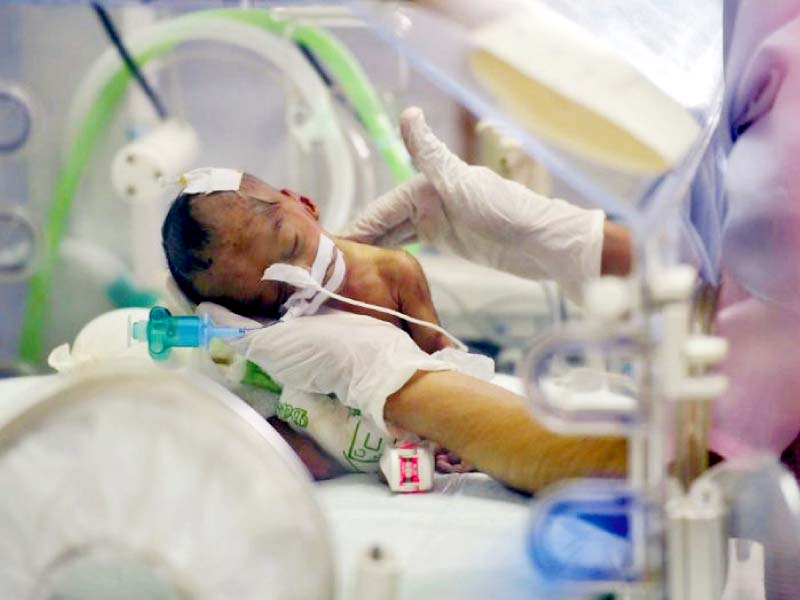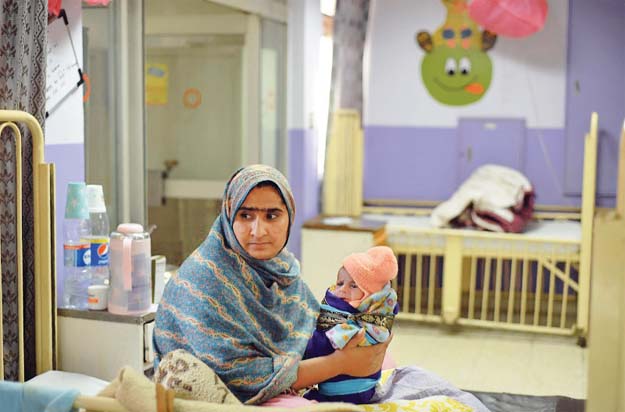
“Evidence based cost effective interventions such as Kangaroo Mother Care (KMC) must be scaled up to reach the most marginalised communities,” says UNICEF Representative in Pakistan Aida Girma. “Progress towards global goals for health and wellbeing is possible only if the number of preterm births and deaths of children under five years of age are reduced,” she added.
With support from UNCIEF, KMC will be launched in the Pakistan Institute for Medical Services (PIMS) Hospital, this month. Training of health care providers from various provinces and areas at PIMS will help scale up the initiative over the next few years to reach the people in neighbouring areas who are most in need.
Parents bring newborn to hospital in a bag
UNICEF has supported the Government of Pakistan in establishing 38 Sick Newborn Care Units at public health facilities across the country. Kangaroo Mother Care is an initiative where special care is provided to the preterm newborns. It is a technique used to keep newborns warm and support breast feeding. The initiative is being introduced in various centres and awareness raising activities are ongoing towards improving care for the newborns at home including timely and appropriate medical appointments for small and sick newborns.

Good hygiene care can help prevent multiple infections while early initiation of breast feeding within the first hour can particularly help prevent deaths. UNICEF emphasises that the reduction in premature births and newborn deaths can be achieved by strengthening health policies and services with focus on maternal nutrition and improving access and care for mothers and newborns.
Each day over 600 newborns die in Pakistan due to complications related to birth asphyxia, prematurity and sepsis says the UNICEF.
Every year 15 million babies in the world are born prematurely and nearly a million die due to related complications. This makes many conclude that preterm birth is one of the leading causes of child deaths under age five.
Child nutritional, mortality rates improve, says report
Although collaborated efforts have helped in reduction of newborn mortality from 55 deaths per 1,000 live births to 42 deaths per 1,000 live births during the last five years, the number of newborn deaths is still unacceptably high and continued efforts are imperative to save precious lives.
Moreover, it should be kept in consideration that the number of child deaths under age five is recorded as being 424 per 1,000 births, while drawing a comparison it can be seen that there is a possibility of factors other than premature births causing infant mortality. Data indicates that inadequate access to healthcare could be a contributing factor to the high level of infant mortality. According to the UNICEF report on infant mortality, only 64% of children are taken to a healthcare provider when they are suspected of having pneumonia.
Furthermore, although only 2% of the local population drinks surface water (i.e. from lakes and rivers), the water hygiene level of drinking water in the country still remains questionable. Although tap water, when unfiltered is prone to contamination, and is known to cause serious health hazards it is consumed by 39% of the population, which can be particularly harmful for infants, as their underdeveloped immune system may make them more vulnerable to severe illnesses.
Lack of clean drinking water can cause a higher number of children to suffer from dysentery. Out of all those children suffering only 38% of infants with diarrhea are given oral re-hydration salts. The lack of access to necessary medication worsens matters. Furthermore, despite the various diseases which can spread through mosquitos, close to no children under the age of five, sleep under insecticide protected nets.
Therefore, the need of the hour is for access to better quality healthcare and also clean drinking water.
Published in The Express Tribune, November 17th, 2018.























COMMENTS
Comments are moderated and generally will be posted if they are on-topic and not abusive.
For more information, please see our Comments FAQ